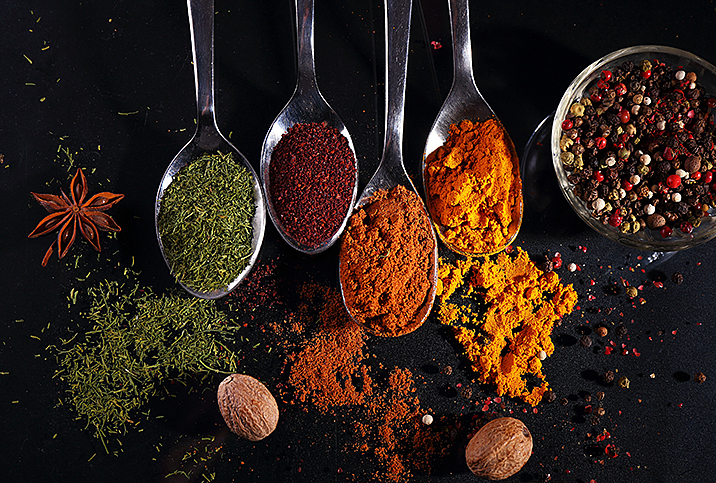The Health Benefits of Cooking With Herbs and Spices

Herbs and spices grow across the world and therefore can be found in almost every type of cuisine.
Big-name spices with health claims, such as turmeric, cinnamon, sage, ginger and more, all have roots in Ayurvedic medicine, one of the oldest holistic systems of healing, tracing back to Indian culture from thousands of years ago.
"In Sanskrit, Ayurveda means 'science of life,'" said Shivangi Tripathi, an Ayurveda holistic practitioner at Mata Ayurveda. "Ayurveda believes in maintaining the health of body and mind through learning about our unique constitution, which is determined by the exact moment of conception. This is our blueprint and it consists of five elements: ether, air, fire, water and earth."
Food plays a huge part in holistic healing, with the goal of preventing illness and healing ailments without medication.
"Spices are used to heal, pacify and balance any imbalance occurring within our doshas [constitutions]," Tripathi said. "They help support our body. For example, turmeric can increase heat in our bodies. It's also antiseptic. Cinnamon is great for diabetes, as it controls sugar spikes. Ginger is used in everyday cooking—in Ayurveda, it's known to help with digestion."
Balancing your meals
You're probably using many of these healthy and healing herbs and spices in everyday dishes without even knowing their benefits, which can be as simple as providing balance in a meal.
"A balanced meal will have all tastes—sweet, sour, salty, bitter and umami—as well as not being too heating or too cooling," said Ameya Duprey, a board-certified Ayurvedic practitioner specializing in Ayurvedic cooking and postpartum care. "Spices can help balance a meal by adding more heat or cooling energy, as well as adding tastes that are lacking, such as a pungent spicy kick or bitter taste. By eating a balanced meal specific to your individual constitution, you maintain a state of health."
Associated health benefits
Even if you're just adding these spices for flavor, color or aroma, the health benefits are certainly an added bonus.
- Black pepper is high in antioxidant properties, which help fight against the damaging effects of free radicals. It also has anti-inflammatory properties, improves brain function and may lower cholesterol levels. Like other peppers, black pepper can promote gut health and is known to reduce appetite.
- Cayenne pepper is primarily known for boosting metabolism, as well as for its anti-inflammatory properties. There are many more claimed health benefits of cayenne pepper, including reducing hunger, lowering blood pressure, aiding in digestive health, relieving pain and improving psoriasis.
- Cinnamon, Duprey noted, is healing in nature, being antimicrobial and an expectorant, making it excellent for colds and coughs. Cinnamon also helps lower cholesterol. It is also known to promote cardiovascular health, and aids in tissue regeneration of the uterus, making this spice appropriate for postpartum healing.
- Turmeric is known for its health benefits as a powerful anti-inflammatory and antioxidant, according to Duprey. It's also good for reducing gas caused by legumes and helps strengthen the immune system.
- Ginger is most known for aiding in digestion and, related, relieving nausea and vomiting. Duprey noted its heating and expectorant properties make it another good choice for colds and the flu. Additionally, ginger's anti-inflammatory properties can help relieve arthritis.
- Sage, technically an herb, is packed with vitamin K, which supports bone health. Sage can also be used to relieve diarrhea and delay the signs of aging.
Many of these herbs and spices are used in cooking but can be taken as oral supplements. Additionally, many find their way into skincare products and can be applied topically. Aromatherapy features many of these herbs and spices in oil form.
Are side effects a concern?
The largest potential concern from taking in too much of an herb or spice is contamination, usually of mycotoxin, other plant toxins or pesticides. In a study published in the National Library of Medicine, black pepper, basil, oregano, nutmeg, paprika and thyme were analyzed for 11 mycotoxins, 134 pesticides and four heavy metals. The report stated mycotoxins were detected in 4 percent of all nutmeg samples, 10 percent of basil samples and 30 percent of thyme samples.
"The residues of 24 pesticides were detected in 59 percent of all the analyzed condiments. A risk assessment of heavy metals was performed, indicating daily intake levels far below the tolerable intake levels," the study reported.
"Though many herbs and spices have toxic properties or contaminants, the dosage would have to be excessively high to experience adverse effects," said Alexis Martinez, a certified wellness coach and dietetics/nutrition student. "Most people can consume them in small amounts without concern."
If you're otherwise healthy, consuming herbs and spices should not be cause for alarm. However, if you're on certain medications or have certain health conditions, there could be negative effects.
"Taking herbs and spices in excessive amounts is never a good idea," said Heather Hanks, a nutritionist at USA RX and holder of an M.S. in complementary and alternative medicine. "They can interact with medications you are currently taking or become toxic when used by themselves in high doses. For example, nutmeg contains a compound that makes you hallucinate when taken in large amounts."
As always, it's best to follow the recipe when adding anything to your food during the cooking process. If you're concerned about the level of herbs and spices you're introducing into your diet, try sharing your recipes with your doctor and getting a second opinion.
Giddy Notice: Our medical experts have informed us that few supplements of this nature have been approved by the Food and Drug Administration (FDA). That is to say, statements and claims made about the efficacy or possible health benefits of these unapproved supplements have neither been evaluated nor reviewed by the FDA for safety and effectiveness. Furthermore, any statements or claims regarding the supplements are not intended to diagnose, treat, prevent or cure any disease. Our medical experts advise that before you use a supplement in any way, first consult with your healthcare provider to ensure you have full knowledge of appropriate dosages, if any, as well as any potential side effects or interactions with any prescription medications you're already taking.


















